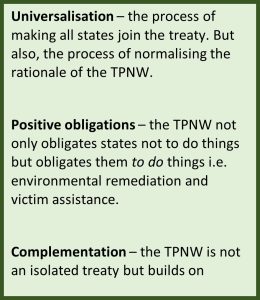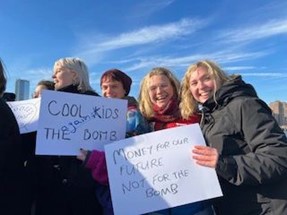By Matty Maslen, Newsletter Editor; photo credit to Darren Ornitz, ICAN
From the 27th of November to the 1st of December last year, I had the privilege to attend the Second Meeting of State Parties to the Treaty on the Prohibition of Nuclear Weapons (2MSP TPNW).
For this article I’ve written a Q&A with myself, using questions that people have tended to ask me when it comes up…
What is the TPNW, and why was the conference held in New York?
The TPNW is the international treaty which made nuclear weapons illegal. It’s more colloquially known as ‘The Ban Treaty’ because that’s what it did: it banned nuclear weapons. When a treaty is first made, countries sign and ratify it.
Then, once 50 states have ratified it, it officially comes into force. For the TPNW this happened in 2021. Once this had happened, the next stage was to hold a meeting with all those who had signed. This meeting occurred in 2022 in Vienna. Just over a year later, the second meeting was convened, with Mexico as the presiding state.
Just to be clear:-
To sign a treaty is to show willing to continue the treaty’s development and a wish to be involved in the process.
To ratify is to go further, to consent to be legally bound by the treaty law.
The meeting was held in New York because the United Nations Headquarters are there. Therefore, although there are other UN locations, such as in Vienna and Geneva, it is in New York that the most countries have a permanent representative.
However, this is not to say that holding the meeting in New York was the most convenient location. Many people, particularly civil society members, had issues obtaining visas and funding, with many ultimately unable to attend.
What was your role?
 Originally, I was given a place to attend the 2MSP as a Youth Delegate through the organisation Youth for TPNW. This is the same organisation I attended the 1MSP with. On the Tuesday we had our official ‘Youth MSP’, held in the UN Church Centre. Here we had Q&A sessions with panels on topics such as universalisation, positive obligations, and complementation, which were the ‘buzzwords’ of the week. These 3 concepts were consistently revisited over the week because they are what makes the TPNW unique among treaties on nuclear weapons.
Originally, I was given a place to attend the 2MSP as a Youth Delegate through the organisation Youth for TPNW. This is the same organisation I attended the 1MSP with. On the Tuesday we had our official ‘Youth MSP’, held in the UN Church Centre. Here we had Q&A sessions with panels on topics such as universalisation, positive obligations, and complementation, which were the ‘buzzwords’ of the week. These 3 concepts were consistently revisited over the week because they are what makes the TPNW unique among treaties on nuclear weapons.
The second half of the Youth MSP consisted of smaller group discussions on what our role is in the disarmament movement, the barriers that currently face us from fulfilling them, and how we can overcome these.
As the official youth events did not fill the entire week, I also applied to the International Campaign to Abolish Nuclear Weapons (ICAN) to volunteer with them on the days I was free. I was given a number of roles across the week:
On the Sunday, the Campaigners Meeting was held at Brick Church, the day before the official MSP began. It was a chance for members of civil society to come together and learn about the work that other organisations had been doing over the past year, to hear about the research people have produced, and to gain clarity in what the expectations were for the week ahead. I was able to attend this meeting as a volunteer on the catering team. This gave me a chance to meet hundreds of inspiring people (everyone needed a coffee at some point!). This meeting was actually one of my favourite parts of the week because it was the ‘campaigners meeting’. In other words, the people doing the groundwork in advocating for, and shaping what is still a very young treaty.
Throughout the rest of the week, I helped as a runner to the main MSP, giving me front-row access to the room (the Trusteeship Council Chamber) where state and civil society representatives gave their statements. It was so exciting to be in the middle of official UN-business.
What talks did you attend?
There were also periods over the course of the week when I did not have an official job to do. I used this time to attend any side-events that piqued my interest. (‘Side-events’ refers to any event that was not the main MSP in the Trusteeship Council Chamber.)
I attended a range of talks, including:
– Voices of Civil Society
– Urgency of Disarmament
– Prevention is the Only Cure
– Influencing Nuclear Weapon States.
Experts in various fields contributed to these events, giving me deeper insight into interdisciplinary approaches to nuclear abolition.
Did you attend any events outside the UN building?
 As well as talks I also attended other events such as the ‘New Manhattan Project Concert: A Concert for Nuclear Abolition’. This was held on the Monday evening in a theatre room in the Japan Society. It was a multi-media concert with a mix of theatre, film and music including a performance by ‘MARK Harmony’, a group of young singers from the Marshall Islands, whose people and lands are some of the most affected by nuclear testing. The evening was incredibly moving and immersive and is something that I will remember forever.
As well as talks I also attended other events such as the ‘New Manhattan Project Concert: A Concert for Nuclear Abolition’. This was held on the Monday evening in a theatre room in the Japan Society. It was a multi-media concert with a mix of theatre, film and music including a performance by ‘MARK Harmony’, a group of young singers from the Marshall Islands, whose people and lands are some of the most affected by nuclear testing. The evening was incredibly moving and immersive and is something that I will remember forever.
Another event which I attended was a Mass dedicated to Dorothy Day. I was invited by members of Pax Christi whom I met at the conference and Brendan Fay, a well-known Catholic nuclear abolition and LGBTQ activist. The Mass was given by the Most Rev. John C. Wester, the Archbishop of Santa Fe, also a nuclear disarmament activist. It was really invigorating to see a member of the clergy using their platform and authority to encourage people to act on an issue which is so important. It really hit home how rare it is for us to be called upon in church to take action other than prayer.
We also held a non-violent, peaceful march and rally through the streets of Manhattan, stopping outside various embassies and official buildings, and held a photoshoot with our banners and posters around the city.
What was the outcome of 2MSP?
One of the most significant decisions made during the 2MSP was that a focus will now be made on delegitimising the deterrence theory as the basis for global security. This is a huge step forward for the international community and the nuclear abolition movement, to have the entire justification for nuclear weapons being questioned.
There was a consensus that the risks posed by nuclear weapons are continuing to increase. This is the result of four main trends that we are seeing across the international community, but particularly from nuclear weapon states:
The 2MSP focused on centring the affected communities. Since the TPNW has a unique focus on the humanitarian impacts of nuclear weapons, through articles 6 and 7, it follows that the voices of those who are most exposed to these impacts were placed at the centre of discussions.
However, there was also a large presence of states who were there merely as observers – meaning they are not state parties to the treaty as they have not ratified it.
What now for the TPNW?
Currently, we are in the ‘intersessional period’. This is just what it says on the tin: the period between sessions, or between meetings. The next meeting (3MSP) will take place in March 2025, also in New York, but this time Kazakhstan will preside.
Over this period, the states work on what was agreed at the end of the 2MSP.
One of the commitments made was that there be an increase in research through the continuation of the informal working groups which were set up as part of the Vienna Action Plan following 1MSP. Between the 1MSP and the 2MSP, these groups went away and carried out research, which was reported back in New York; the same will happen now. One of the ‘youth statements’ asks that youth not be given simply a ‘token place’ within the treaty, but rather that we are involved at all levels as “article 8 necessitates our inclusion”. For this reason, the statement asked that young people make-up 20% of each working group.
One of the major developments we will be watching for in this intersessional period, is the introduction of a voluntary international trust fund. This fund would be used for victim assistance and environmental remediation.
What do we do now?
In this time, between now and the next MSP, we need to work to increase awareness of the TPNW so that we can create a movement to lobby the UK government to sign and ratify the treaty – or at least to agree to attend the 3MSP as an observer. The government will not do this of their own accord, we must put pressure on them.
